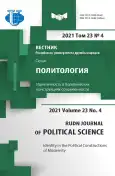Civic Identity: Diversity of Meanings and Achievement of Solidarity
- 作者: Mchedlova M.M.1,2, Sargsyan H.L.3
-
隶属关系:
- Peoples’ Friendship University of Russia (RUDN University)
- Theoretical and Applied Sociology of the Russian Academy of Sciences
- Russian-Armenian University
- 期: 卷 23, 编号 4 (2021): Identity in the Political Constructions of Modernity
- 页面: 648-658
- 栏目: IDENTITY IN THE POST-SOVIET SPACE
- URL: https://journal-vniispk.ru/2313-1438/article/view/322100
- DOI: https://doi.org/10.22363/2313-1438-2021-23-4-648-658
- ID: 322100
如何引用文章
全文:
详细
The concept of identity reflects the ongoing shifts in political theories when external parameters that did not previously fall into the optics of political research become a part of political reflection and political analysis. Emphasizing sociocultural issues captures not only the departure from the linear normativity of political theory and pragmatics but also the search for modern explanatory models that cannot be reduced merely to institutional determinism. The controversy and ambiguity of the civic identity concept are imposed on the need for interpreting the formation of civic communities in the newly emerged independent countries after the collapse of the Soviet Union (on the example of Russia and Armenia), including the possibilities of protest and project identity. Methodologically the article is based on the perception that the construction of civic identity cannot be reduced to the normative understanding only. The authors bring out the causal complexes that predetermine the construction of civic identity, while also highlighting the differences in how civic communities and their value focuses are perceived and constructed in Russia and Armenia. The authors also define the general features of civic identity, which can be described as a common basis of solidarity, the removal of particularity and a shared vision of the future.
作者简介
Maria Mchedlova
Peoples’ Friendship University of Russia (RUDN University); Theoretical and Applied Sociology of the Russian Academy of Sciences
编辑信件的主要联系方式.
Email: mchedlova-mm@rudn.ru
ORCID iD: 0000-0002-4635-1741
Doctor of Science in Political Science, Professor, Head of the Department of Comparative Politics of RUDN University, Chief Researcher in the Center “Religion in Contemporary Society” of the Federation Institute of Sociology - Branch of the Federal Center of Theoretical and Applied Sociology of the Russian Academy of Sciences
Moscow, Russian FederationHovhannes Sargsyan
Russian-Armenian University
Email: hovhannes.sargsyan@rau.am
ORCID iD: 0000-0001-5912-7936
PhD in Philosophy, Associate Professor, Head of the Department of Political Science
Yerevan, Republic of Armenia参考
- Castells, M. (1999). L’ère de l’information. Le pouvoir de l’identité. Paris, Fayard, 1999. (In French).
- Drobizheva, L.M. (2020b). All-Russian national identity: Searching for definition and distribution dynamics. Sotsiologicheskie issledovaniya [Sociological Studies], 8, 37–50. (In Russian).
- Drobizheva, L.M., & Ryzhova, S.V. (2021). All-Russian identity in the sociological dimension. Bulletin of Russian nation, 1–2, 39–52. (In Russian).
- Drobizheva. L.M. (2020a). The meanings of All-Russian civic identity in Russian mass consciousness. Monitoring of Public Opinion: Economic and Social Changes, 4, 480–498. https://doi.org/10.14515/monitoring.2020.4.1261. (In Russian).
- Fadeeva, L.A., & Nazukina, M.V. (2020). Institutionalization of political science in Russia: Factors, levels, results (on the example of identitarian studies). Political science (RU), 1, 201–220. DOI: http://www.doi.org/10.31249/poln/2020.01.08 (In Russian).
- Grechko, P.K. (2015). We are a multinational people, or does the people have a nation? Personality. Culture. Society. XVII, 3–4 (87–88), 8–20. DOI: 1606=951Х.2015.2.2079 (In Russian).
- Malakhov, V.S. (1998). Inconveniences with identity. Voprosy Filosofii [Problems of Philosophy], (2), 43–53. (In Russian).
- Malakhov, V.S. (2001). Identity. In New Philosophical Encyclopedia (p. 78). Vol. 2. Moscow. (In Russian).
- Mchedlova, M., & Kazarinova, D. (2020). The identity politics: competition of new theoretical meanings and political strategies. Political science (RU), (4), 13–35. DOI: http://www.doi.org/10.31249/poln/2020.04.01 (In Russian).
- Mchedlova, M.M. (2016). Sociocultural meanings of politics: New logic of interpretation and religious references. Polis. Political Studies, (1), 157–174. https://doi.org/10.17976/jpps/2016.01.11 (In Russian).
- Mosca, G. (1994). The ruling class. Sotsiologicheskie issledovaniya [Sociological Studies], (10), 187–198. (In Russian).
- Sarkisyan, H. (2019). On the compatibility of the “global nation” model with the national State project (on the example of Armenia and the Armenians). In O.V. Gaman-Golutvina et al. (Eds.), Trajectories of Russia’s Political Development: Institutes, projects, actors: materials of the All-Russian Scientific Conference RAPS (рр. 354–355). Moscow: MPSU. (In Russian).
- Sarkisyan, H.L., & Dunamalyan, N.A. (2020). The dynamics of civil identity transformation in modern Armenia: Factors and subjects. Polis. Political Studies, (2), 53–72. https://doi.org/10.17976/jpps/2020.02.05 (In Russian).
- Semenenko, I.S. (2016). Identity politics and identities in politics: Interethnic perspectives in a European context. Polis. Political Studies, (4), 8–28. https://doi.org/10.17976/jpps/2016.04.03 (In Russian).
- Tishkov, V.A. (2013). The Russian people. The History and meaning of national identity. Moscow: Nauka. (In Russian).
- Tishkov, V.A., & Pivneva, E.A. (Eds.). (2018). Historical Memory and Russian Identity. Moscow: RAS. (In Russian).
- Touraine, A. (1973). Production de la societe. Paris. (In French).
补充文件









